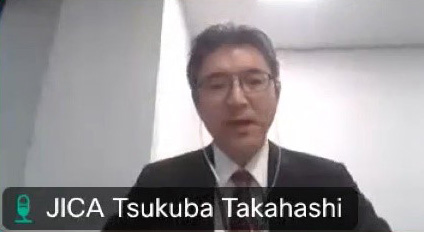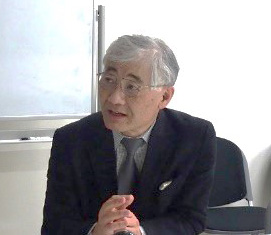ICHARM, in collaboration with the Graduate Institute of Policy Studies (GRIPS) and the Japan International Cooperation Agency (JICA), offers a master's program, "Water-related Disaster Management Course of Disaster Management Policy Program," and a doctoral program, " Disaster Management Program." These programs have produced a total of 199 graduates since their commencement. As a follow-up activity for these graduates, ICHARM has been holding the Follow-up Seminar annually since 2007.
The 16th seminar was held online on February 13, 2024, with an attendance of 41 graduates from 20 countries and 23 students from 12 countries currently studying in the master’s and doctoral programs. This year’s event was planned with the additional aim of supporting the current students in gaining perspectives on their future careers. (For more information, see the program of the Follow-up Seminar, which follows this article.)
The seminar, moderated by Senior Researcher MIYAMOTO Mamoru, began with greetings from JICA Tsukuba Director TAKAHASHI Ryo and a video message by GRIPS President OTA Hiroko. On behalf of the organizers, President FUJITA Koichi of the Public Works Research Institute (PWRI) also made an opening speech. He first mentioned how PWRI had been engaged in the disaster response efforts after the Noto Peninsula earthquake and then told the participants that: “Every disaster has a new aspect, and by learning lessons from disasters, we can cope more wisely with future disasters, including water-related disasters.” He also hoped that the participants would gain new and beneficial insights from the seminar.
Mr. Abou Amani, the director of the Division of Water Sciences at UNESCO, followed, delivering a keynote speech titled "Intergovernmental Hydrological Programme (IHP IX 2022-2029): Science for a Water Secure World in a Changing Environment." He first stressed that water should be regarded as the core of SDGs and recognized as playing a liaison role in connecting international commitments such as SDGs and the Paris Agreement. He then explained that the UNESCO IHP, which will celebrate its 50th anniversary in 2025, is currently working on five priority issues and 23 cross-cutting issues under its 9th strategic plan. He also informed the audience of a UNESCO-led project to install early warning systems in Africa to reduce flood and drought damage.
After the speeches, the participants were divided into four groups with a different focus on disaster risk reduction, sediment, hydrology, or meteorology and engaged in discussions about the ICHARM Alumni MEta Knowledge Database (iAME) and the ICHARM Alumni Webinar under the facilitators selected in advance from the graduates.
Afterwards, the participants gathered again for a general session where the current students asked questions to the former students. The questions included, for example, how their connection with ICHARM has influenced their work after graduation.
Also, in the general session, the facilitators of each group reported the outcome of the group session. Then, additional discussion continued about iAME, including what data to store and who should be allowed access to the data. The participants also talked about the ICHARM Alumni webinar, such as frequency and method.
Finally, Executive Director KOIKE Toshio wrapped up the seminar by expressing his gratitude to the participants for their enthusiastic discussions. He also shared his intention to launch theme-specific webinars as a new initiative.
ICHARM hopes that this seminar has further strengthened our ties with the former and current students, thereby contributing to closer cooperation in future activities.
 |
 |
 |
 |
 |
|
 |
||
This master’s program was launched in 2007 in collaboration with GRIPS and JICA. It is targeted at administrative staff from various countries and designed to earn a master’s degree in one year. As of February 2024, 182 students from 36 countries graduated. In the 2023-2024 academic year, 13 students are enrolled.
Doctoral program: “Disaster Management Program”This doctoral program was launched in 2010 in collaboration with GRIPS. It aims to produce experts who can demonstrate leadership in policy formulation and implementation of water-related disaster risk management. As of February 2024, 17 students from 8 countries graduated, and 10 students are currently enrolled.
| 1. Opening (15 minutes) | |
| 17:00 – 17:05 | Mr. TAKAHASHI Makoto, Director General, JICA Tsukuba at Japan International Cooperation Agency |
| 17:05 – 17:10 | Pres. OTA Hiroko, President, National Graduate Institute for Policy Studies (Video message) |
| 17:10 – 17:15 | Dr. FUJITA Koichi, President, National Research and Development Agency Public Works Research Institute |
| 2. Keynote address (30 minutes) | |
| 17:15 – 17:45 | Dr. Abou Amani, Director of the Division of Water Sciences and Secretary of the Intergovernmental Hydrological Programme, United Nations Educational, Scientific and Cultural Organization (UNESCO) |
| Focus Group Discussion (75 minutes) | |
| 18:00 – 18:20 | Explanation from ICHARM (20 minutes) |
| 18:20 – 19:15 | Group Discussion (55 minutes) In the group discussion, alumni discuss the following two topics. ・what kind of information alumni need into the Icharm Alumni MEta Knowledge Database. ・Local issues faced by alumni who would like to discuss in the ICHARM Alumni webinar Group1 DRR, Group2 Sediment, Group3 Meteorology, Group4 Hydrology |
| 4. Interaction between alumni and current students (35 minutes) | |
| 19:20 – 19:55 | Question and answer session |
| 5. General Sharing of Group Discussion (30 minutes) | |
| 19:55 – 20:25 | Facilitators report their group’s discussion in 2 minutes |
| 6.Closing (5minutes) | |
| 20:25 – 20:30 | Prof. KOIKE Toshio |